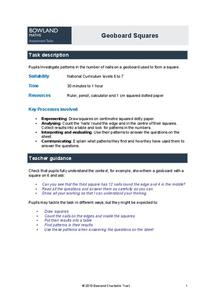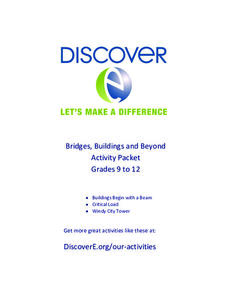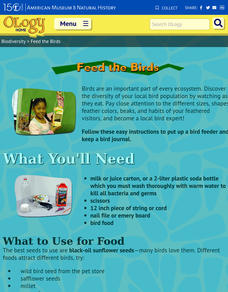Curated OER
Home Living / Daily Living: Nail Care
Nails can get really dirty really fast. Prepare your special education class for life on their own by introducing them to a regular nail care routine. They discuss why it is important to care for your nails and practice washing,...
Curated OER
Understanding the Body, Day 3: Sexual Health & Hygiene
Ideal for secondary moderately disabled special ed students, this lesson focuses on personal hygiene and self-care. They discuss a case study and role-play to introduce the importance of good hygiene then discuss current appropriate...
Bowland
Geoboard Squares
Don't be a square! Help your budding mathematicians discover patterns within squares. Scholars create squares on geoboards and identify patterns in the number of nails, both nails on the edge of the squares and nails within the squares....
Curated OER
Mohs Hardness Test
Fifth graders listen as they are told about another way to classify rocks; by their hardness. They observe the Mohs Hardness Test overhead, discover how the test works, and then use materials such as pennies, butter knives, nails, and...
Perkins School for the Blind
Identifying and Using Tools
How can you teach a person about technology and engineering if he has never been exposed to the tools and devices used to create and construct? Learners with visual impairments examine a number of common tools, such as hammers, wrenches,...
Curated OER
RSB Dermatology Wordsearch Puzzle #1
In this health worksheet, students find the words that are related to the practice of dermatology and the answers are found at the bottom of the page.
Curated OER
Stargazing Astronomy: A Ceiling Full of Stars
Students make an observe a planetarium using a can with nail holes, black paper and a flashlight.
Curated OER
Moh's Hardness Test
Young geologists utilize Moh's hardness scale to help them correctly sort and classify different types of rocks. This lesson has everything you need, including an excellent example of the Mohs' Hardness Test, to successfully implement...
Curated OER
Displacement Reactions
Five metal samples are tested for their reactivity with different solutions. From the results they discover the order of reactivity for copper, iron, lead, magnesium, and zinc. Have your aspiring chemists perform this laborabory exercise...
Curated OER
What a Hard Test!
Fifth graders complete an exercise that introduces them to Moh's scale of mineral hardness. The scale is presented on the activity, and learners answer three questions which have them assign a hardness rating based on some clues. For any...
Curated OER
Phoneme Identification with Sound-it-Out Chips
Looking for a tangible way to help emerging readers identify phonemes? You've found it! They use chips without letters to segment single-syllable words into first, middle, and last sounds. As you say each sound, scholars place a chip on...
Curated OER
Are Beds Made of Balsa Wood?
Here is an interesting resource which describes different kinds of wood and their uses. There is a table with six different types of furniture wood listed, and the number of worm holes found in each one. Based on the information in the...
DiscoverE
Make a Light Bulb
Could you reinvent the light bulb? Scholars tap into their inner Thomas Edisons to build a light bulb prototype out of a jar and some wires. They see how long the filament wire glows in the jar (batteries not included) to measure their...
Nemours KidsHealth
Skin Cancer: Grades 6-8
Do we really need sunscreen? What are the risks of tanning? Learners explore these questions through a series of informational texts and engaging, hands-on activities.
NOAA
Motion from the Ocean
Create a fish mobile using cardboard and string to hang in the classroom while studying ocean life. Each printable requires pupils to cut out two of the same fish to create consistency on the front and back.
DiscoverE
Building Begins with a Beam
A sturdy beam made of foam seems like an oxymoron. Scholars design a 48-inch beam that can hold a one-pound weight. The beam should be sturdy enough so it doesn't bend too much. If it does, the egg placed underneath the beam will break.
DiscoverE
Bridges, Buildings and Beyond Activity Packet: Grades 9-12
Shore up engineering knowledge with some building activities. Scholars design a foam beam, create a structure from playing cards, and construct a paper tower that won't topple over in the wind. Along the way, they learn about engineering...
NOAA
Why is Hawaii's Ocean Important?
Studying the oceans? Focus on Hawaii's ocean with a resource packed with activity-based worksheets. Everything from products that come from the ocean to the abundance of plants and animals that call the ocean their home, Hawaii's ocean...
American Museum of Natural History
Feed the Birds
What kinds of birds are common in the area? Young scientists use household supplies to create bird feeders. They then document the birds that come to their feeders by keeping journals.
American Museum of Natural History
Feed the Birds
Scholars use a large carton, string, an emery board, and bird food to create a hand-made bird feeder. After completing the craft, pupils keep a journal to track their observations.
Curated OER
SIZING UP SOL
Ninth graders produce a projected, pinhole image of the sun and from measurement of the image and projection distance, calculate the actual size of the sun. They estimate the sun's apparent brightness from different planet.
Curated OER
Physical Science- Sink or Float?
Learners investigate which objects sink and which ones float. Learners engage in an experiment, make predictions, and record results on a graphic organizer. This is a comprehensive and easy to follow resource.
Scholastic
Harriet Tubman: Moses of Her People
Who was Harriet Tubman, and what was her place on the Underground Railroad? Recall the bravery and achievements of this extraordinary figure with a short, engaging informational text and crossword puzzle.
Curated OER
Understanding the Body, Day 3: Sexual Health and Hygiene
Pupils identify the components of good hygiene and the consequences of poor hygiene. They practice using different hygiene tools and discuss how often they should be used. They discover that hygiene is a personal responsibility.

























